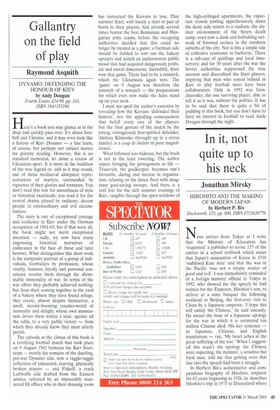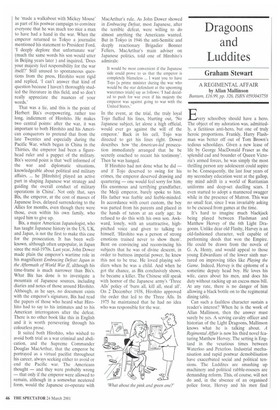In it, not quite up to his neck
Jonathan Mirsky
HIROHITO AND THE MAKING OF MODERN JAPAN by Herbert P. Bix Duckworth, £25, pp. 800, ISBN 0715630776 News arrives from Tokyo as I write that the Ministry of Education has 'requested' a publisher to revise 137 of the entries in a school textbook which states that Japan's annexation of Korea in 1910 'stabilised East Asia' and that the war in the Pacific 'was not a simple matter of good and evil'. I was immediately reminded of a foreign ministry official in Tokyo in 1992, who showed me the speech he had written for the Emperor, Hirohito's son, to deliver at a state banquet the following weekend in Beijing, the first-ever visit to China by a Japanese emperor. 'I hope this will satisfy the Chinese,' he said uneasily. He meant the issue of a Japanese apology for the war in which it is estimated ten million Chinese died, His key sentence — in Japanese, Chinese, and English translations — ran, 'My heart aches at the great suffering of the war.' When I suggested this wasn't the apology the Chinese were expecting, the minister, a sensitive but loyal man, told me that getting even that line into the speech had been a struggle.
In Herbert Bix's authoritative and compendious biography of Hirohito, emperor for 62 years beginning in 1926, he describes Hirohito's trip in 1975 to Disneyland where
he 'made a walkabout with Mickey Mouse' as part of his postwar campaign to convince everyone that he was much too nice a man to have had a hand in the war. When the emperor returned to Tokyo a journalist mentioned his statement to President Ford, 'I deeply deplore that unfortunate war' (much the same words his son would utter in Beijing years later ) and inquired, 'Does your majesty feel responsibility for the war itself?' Still unused to spontaneous questions from the press, Hirohito went rigid and replied, 'I can't answer that kind of question because I haven't thoroughly studied the literature in this field, and so don't really appreciate the nuances of your words.'
That was a lie, and this is the point of Herbert Bix's overpowering, rather too long, indictment of Hirohito. He makes two central points: after the war, it was important to both Hirohito and his American conquerors to pretend that from the late Twenties and especially during the Pacific War, which began in China in the Thirties, the emperor had been a figurehead ruler and a puppet of the military. Bix's second point is that 'well informed of the war and diplomatic situations, knowledgeable about political and military affairs, .„ he [Hirohito] played an active part in shaping Japanese war strategy and guiding the overall conduct of military operations in China'. Not only that, says Bix, the emperor, at the cost of masses of Japanese lives, delayed surrendering to the Allies for months, even though there were those, even within his own family, who urged him to give up.
Bix, a major American Japanologist, who has taught Japanese history in the US, UK, and Japan, is not the first to make this case for the prosecution. It has been wellknown, although often unpopular, in Japan since the mid-1970s. Last year, John Dower made plain the emperor's wartime role in his magnificent Embracing Defeat: Japan in the Aftermath of World War II, although his time-frame is much narrower than Bix's. What Bix has done is to investigate a mountain of Japanese sources, including diaries and notes of those around Hirohito. Although, as he says, no document exists with the emperor's signature, Bix had read the papers of those who heard what Hirohito had to say to his intimates and to his American interrogators after the defeat. There is no other book like this in English and it is worth persevering through his colourless prose.
It suited both Hirohito, who wished to avoid both trial as a war criminal and abdication, and the Supreme Commander Douglas MacArthur, that the emperor be portrayed as a virtual pacifist throughout his career, always seeking either to avoid or end the Pacific war. The Americans thought — and they were probably wrong — that only if the emperor were allowed to remain, although in a somewhat neutered form, would the Japanese co-operate with
MacArthur's rule. As John Dower showed in Embracing Defeat, most Japanese, after the terrible defeat, were willing to do almost anything the Americans wanted. But in Tokyo in 1946 the anti-Semitic and deeply reactionary Brigadier Bonner Fellers, MacArthur's main adviser on Japanese politics, told one of Hirohito's admirals: It would be most convenient if the Japanese side could prove to us that the emperor is completely blameless ... I want you to have Tojo [a prime minister during the war who would be the star defendant at the upcoming warcrimes trials] say as follows: 'I had decided to push for war even if his majesty the emperor was against going to war with the United States.'
In the event, at the trial, the truly loyal Tojo fluffed his lines, blurting out, 'No Japanese subject, let alone a high official, would ever go against the will of the emperor.' Back in his cell, Tojo was directed to get his lines right. Dower describes how 'the American-led prosecution immediately arranged that he be secretly coached to recant his testimony'. Then he was hanged.
If Hirohito had not done what he did — and if Tojo deserved to swing for his crimes, the emperor deserved drawing and quartering — one would feel sorry for him. His enormous and terrifying grandfather, the Meiji emperor, barely spoke to him. His father was feeble and feeble-minded. In accordance with court custom, the boy was parted from his parents and placed in the hands of tutors at an early age; he refused to do this with his own son. Awkward, lonely, with an unattractive, highpitched voice and given to talking to himself, 'Hirohito was a person of strong emotions trained never to show them'. Bent on convincing and reconvincing his subjects that he was of divine descent, in order to buttress imperial power, he knew this not to be true. He loved playing soldiers when he was a child. And when he got the chance, as Bix conclusively shows, he became a killer. The Chinese still speak with horror of the Japanese army's 'Three AlIs' policy of 'burn all, kill all, steal all'. On 2 December 1938, Hirohito approved the order that led to the Three AlIs. In 1975 he maintained that he had no idea who was responsible for the war.















































































 Previous page
Previous page